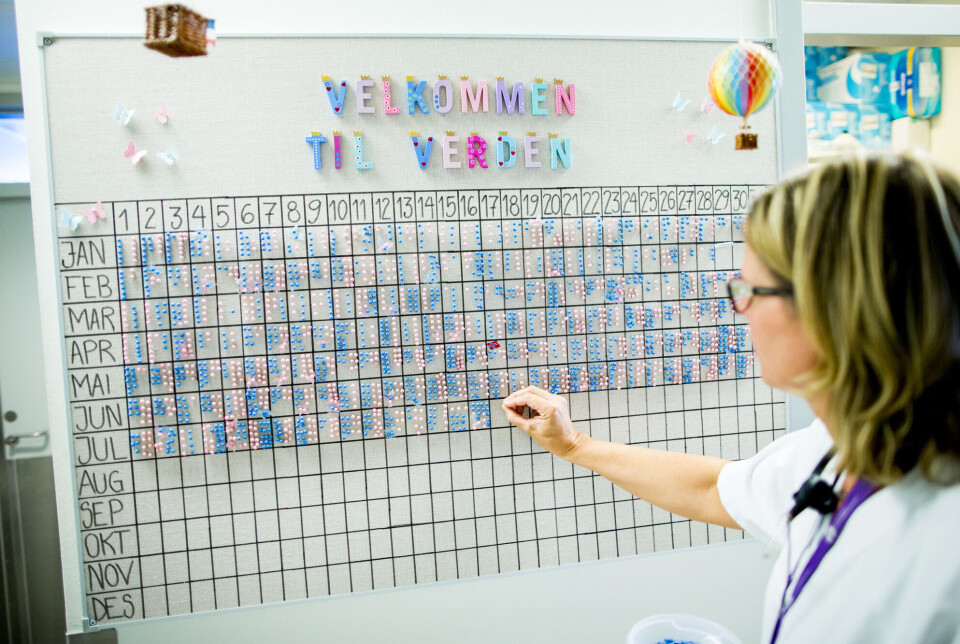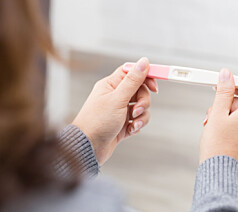
Norwegian midwives are sceptical about encountering pregnant transmen
But some midwives changed their attitude after participating in a study. “The interview really gave many of them something to think about,” says midwife Hilde Ostad.
Michael is married to Anders and has a full beard. He was born female, but has identified as male since high school. For ten years he was on testosterone, and he has had both breasts removed.
Now he is pregnant and has come to the Norwegian health service for care.
This was the essence of one of the fictional patient stories presented to midwives in a new Norwegian study.
‘ ‘I have to admit that four or five years ago, I said to my husband, “You know, the day I have to be midwife to a man is the day that I’ll quit being a midwife”,’ one of the midwives in the study said.
Have to rethink things
Several of the twelve study participants said it would feel both strange and sensational to meet a pregnant man.
Åsgeir Almvik is one of the three midwives at the University of South-Eastern Norway behind the new study, which has been published in the scientific journal Sexual & Reproductive Healthcare.
He believes the scepticism they saw is rooted in what participants are used to.
“What we have learned and navigate from is that it takes a man and a woman to start a family. And for years women have been welcomed into maternity wards or during pregnancy. And then you suddenly have to think differently,” Almvik said to sciencenorway.no.
Because in Norway, pregnant men have not yet been an issue.

No longer required sterilization
Before 2016, Norwegian authorities required transgender people to be sterilized if they wanted the correct gender to appear on their passports.
After the requirement for sterilization was lifted, people have been able to choose for themselves.
This means that transgender men can keep the uterus and genitals they were born with if they want to.
So you can be a man, but use your body like a woman.
In addition, figures from Rikshospitalet (Oslo University Hospital) show that more and more Norwegians want to be considered for gender-reassignment treatment.
In other words, it may be much more common in the future for men in Norway to become pregnant.
Difficult to understand desire for children
Some transmen may simply wish to give birth to their own children. For others, the pregnancy may be unplanned.
But why would a transman want to get pregnant when they identify as male? Several of the midwives asked this question.
“You become a man, and then you’re going to do one of the most feminine things there is,” Almvik said about the participants' thinking.
“This results in questions that don't necessarily have much to do with the pregnancy, questions that are out of personal curiosity rather than professional,” he said.
Inappropriate questions may offend
Several of the midwives were afraid that they would not be able to act professionally.
Still others thought it should be acceptable to be curious.
“I'm going to ask about everything, one person said,” Hilde Ostad tells sciencenorway.no.
Ostad conducted the interviews with Almvik, as part of their joint master's thesis at the University of South-Eastern Norway.
But inappropriate questions can be perceived as offensive, according to Ostad, who in addition to being a midwife works as a sexological adviser at a Health Centre for Youth. In this capacity, she encounters trans people from kindergarten age to young adults.

Dismiss prejudices with colleagues
Midwives, nurses and doctors have a duty to provide proper health care. But this is not enough.
The help must also involve caring, says Marita Nordhaug, a nurse who studies and teaches ethics at OsloMet, Oslo Metropolitan University.
At the same time, it can be difficult to keep your private attitudes completely separate from your profession as a nurse or midwife, Nordhaug said.
“It's not strange to find something so new to be slightly difficult, that you feel you have to stop and think about it," she said.
The idea of two women having children was foreign before. Now it has become normalized, while the fact that a man can get pregnant is still very new.
Midwives changed their attitude along the way
Midwives should consequently be given the opportunity to air their own prejudices or uncertainties with colleagues, Nordhaug said.
“It can be nice to work with reflection groups, preferably interdisciplinary, and dare to put things into words. To be able to say that I thought this was difficult or that I was stupid and used the wrong pronoun,” she said.
Talking about the topic also affected the participants in the study.
Several of the midwives who were sceptical became more positive along the way.
Would not have left the profession today
“There were several people who thought things changed during the interview,” Hilde Ostad said.
These midwives concluded that if you're pregnant, you're pregnant, regardless.
‘He has a right to the same things as any other pregnant person who comes into my office, a right to the same type of care and guidance and whatever else he might need. But this is clearly something new, so I don’t really know how I would react,’ said one of the participants.
The midwife who had told her husband that she would quit the profession if she met a pregnant man, said that she no longer thought about it in that way:
'But you change over time, don’t you – it’s a process – so, today I don’t think it would present any challenges for me as a midwife.’

May avoid the healthcare system
There has been very little research in this field in Norway.
But a summary of international research from 2021 shows the consequences scepticism among midwives can have.
Stigmatization and unprofessional behaviour from health personnel can prevent pregnant transmen from getting the care they need. They can simply avoid using the healthcare system during pregnancy.
In the worst case, this can harm both the pregnant person and the child.
Roller coaster of hormones
Lack of knowledge was a problem highlighted by several of the midwives in the study.
They said they were unsure how they would support a pregnant man, both physically and mentally.
'The challenges would be that I wonder if I would interact with the pregnant person in the right way. I might say or do the wrong thing. I would have to ask him to let me know if I went too far one way or the other ,'one of the participants said.
It is important that midwives are aware of how a pregnancy can be experienced for a transman, according to Ostad. Pregnancy can trigger a strong discomfort with one's own body.
“They have to go through a real rollercoaster of hormones. So pregnancies can be both emotionally and hormonally more difficult than usual,” Ostad said.
Hot topic
Åsgeir Almvik hopes the topic can be normalized among midwives, although it is unlikely to become common.
“It’s a hot topic. If you scroll on Twitter or read a bit in the comments section when issues about trans people come up, attitudes are so harsh and horrible against them. I think it's important that our profession understand something more than what you as a private person would,” he said.
OsloMet’s Marita Nordhaug believes the topic should have a place in nursing and midwifery education so that midwives can act professionally, also in the face of their own insecurities or prejudices.
“It has to enter the literature as well, but perhaps that is not enough. You may have to work on ethical reflection with the students. You can start from experiences and questions students have, instead of starting with big concepts and theories,” Nordhaug said.
Translated by Nancy Bazilchuk
References:
Åsgeir Almvik mfl.: Being a man, but using the body as a woman — Norwegian midwives' thoughts on providing antenatal care for pregnant transmen. Sexual & Reproductive Healthcare, 2023.
Lori Rebecca-Diane MacLean: Preconception, Pregnancy, Birthing, and Lactation Needs of Transgender Men. Nursing for Women's Health, 2021. Summary.
———
Read the Norwegian version of this article at forskning.no





































